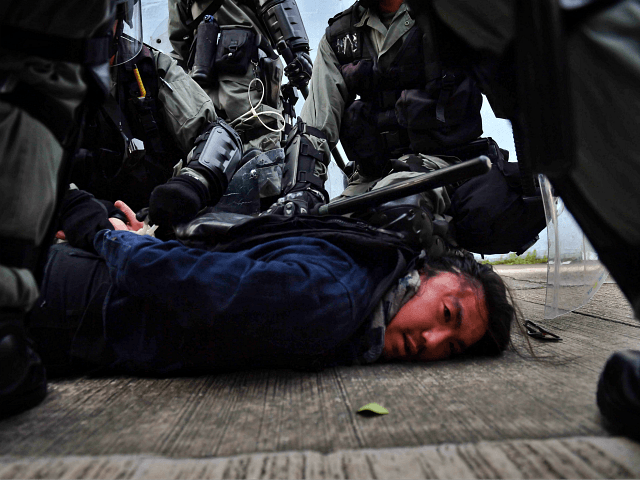Chinese state media on Friday celebrated support for “more than 70 countries” for its brutal crackdown on dissent in Hong Kong – a number that includes such global titans of human rights as North Korea, Venezuela, Cuba, and Afghanistan.
China’s state-run Global Times undermined its propaganda a bit by eagerly pointing out that the Hong Kong crackdown was supported by many of the same authoritarian regimes that professed themselves untroubled by China’s concentration camps for the Uyghur Muslims of Xinjiang province. The Uyghur camps just got back into the headlines this week with a massive U.S. Customs seizure of beauty products suspected of being made with slave labor, including human hair potentially harvested from Uyghur detainees.
The Global Times quoted its rogue’s gallery of unlovely regimes making a joint statement to the U.N. Human Rights Council (UNHRC) supporting the “national security law” Beijing just imposed on Hong Kong. Most of them essentially agreed with Beijing’s position that Hong Kong affairs are purely an internal matter for the Chinese government, although some went further and said the Chinese Communist Party (CCP) is correct to view Hong Kong as a special threat to its national security.
A few went even further and celebrated the oppressive law as a positive step toward enhanced human rights, in essence agreeing with the CCP’s position that political dissent menaces the human rights of regime loyalists, much as allowing Uyghur Muslims to run around loose and practice their religion would threaten the human rights of Han Chinese living in Xinjiang province:
The representative from Afghanistan stressed that the law will not undermine the “one country, two systems” principle and the legitimate rights, freedoms and interests of Hong Kong residents. Cabo Verde’s representative said China’s national security law for the HKSAR comes under China’s sovereignty and it has nothing to do with human rights issues.
Burundi said it welcomes China’s efforts to promote and protect human rights and its contributions to the international human rights cause. The representative said the law will protect the human rights of Hong Kong residents, noting that both the HKSAR and the Xinjiang Uygur Autonomous Region are integral parts of China. Burundi urged relevant countries to immediately cease acts that are in violation of the Charter of the United Nations, which include using Hong Kong and Xinjiang affairs and human rights issues to interfere in China’s internal affairs.
A key CCP political point underscored by many signatories of the UNHRC letter is the notion that “human rights” are a hypocritical Western racket devised as an excuse for countries like the United States to meddle in the affairs of other nations:
Ethiopia, Cote d’Ivoire and Madagascar said Hong Kong affairs were China’s internal affairs. They said the UNHRC should abide by the principles of objectivity, impartiality, constructiveness, non-politicization and non-selectivity, and it should refrain from politicizing human rights issues or adopting double standards.
Indonesia, Vietnam, Bahrain, Sudan, Algeria, Nigeria and Morocco said that all countries should abide by the basic norms governing international relations, including non-interference in other countries’ internal affairs, and said they oppose interference in other countries’ internal affairs using the excuse of human rights issues.
Taken seriously, this point of view would negate the very reason for the UNHRC’s existence. If the human rights of Chinese people are whatever the Chinese government says they are, the human rights of Vietnamese people are defined by the ruling party in Vietnam, and so forth, then what is the point of an international human rights “council?”
The very presence of China’s supporters on the UNHRC has already done much to delegitimize the organization. One of China’s proud supporters for the Hong Kong crackdown is Myanmar, which is fresh from a largely successful campaign of ethnic cleansing that international courts have denounced as genocide. The leader who presided over this atrocity, Aung San Suu Kyi, was given a Nobel Peace Prize decades ago when she was a member of the oppressed political opposition. The Nobel committee refuses to withdraw the prize now that she’s in charge of her country and is defending a campaign of murder and rape, using much the same language as Beijing is employing to justify its oppression of Hong Kong.
Other Chinese media reports asserted the number of countries supporting the Hong Kong crackdown is “expected to rise,” as more of Beijing’s allies step forward to declare their support for the “One Country, Two Systems” principle, even though Beijing just erased one of those two systems.
This week, 27 countries issued a joint statement to the United Nations – unusually delivered out loud and in person by British Ambassador to the U.N. Julian Braithwaite – expressing their “deep and growing concerns” over the Hong Kong security law, which they denounced as a dire threat to the same “One Country, Two Systems” idea of limited autonomy China’s allies claim to respect.
“We urge the Chinese and Hong Kong governments to reconsider the imposition of this legislation and to engage Hong Kong’s people, institutions and judiciary to prevent further erosion of the rights and freedoms that the people of Hong Kong have enjoyed for many years,” the statement said. It also reiterated the concerns of its signatories about the Uyghur concentration camps.
On Thursday, the U.S. Senate unanimously approved a bill that would target Chinese officials responsible for implementing the Hong Kong security law with heavy sanctions, including penalties for any companies or financial institutions that do business with the sanctioned individuals.
U.S. Secretary of State Mike Pompeo denounced the Hong Kong law as an “affront to all nations,” noting that some of its provisions ostensibly apply to “offenses committed outside of Hong Kong by nonresidents of Hong Kong, and this likely includes Americans.”

COMMENTS
Please let us know if you're having issues with commenting.